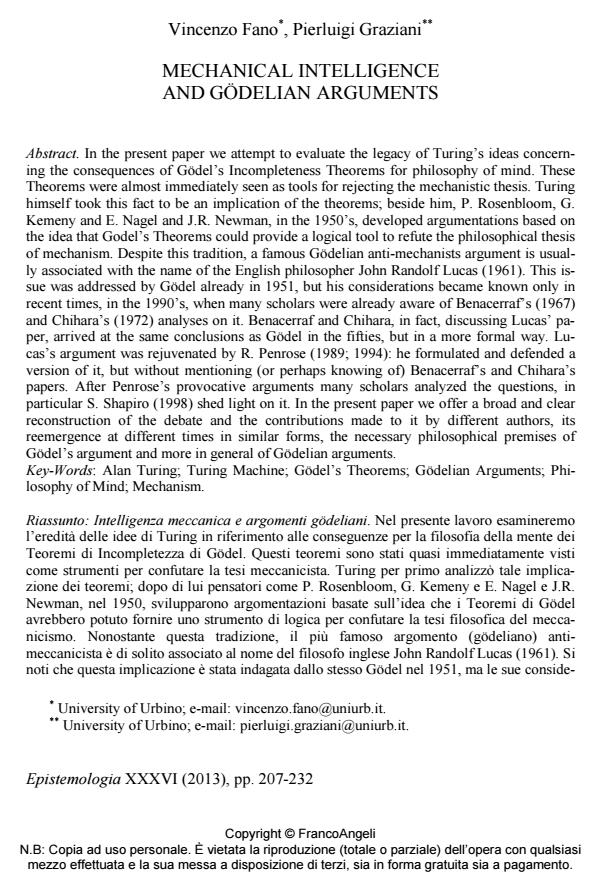Mechanical intelligence and Godelian Arguments
Journal title EPISTEMOLOGIA
Author/s Vincenzo Fano
Publishing Year 2014 Issue 2013/2
Language English Pages 26 P. 207-232 File size 689 KB
DOI 10.3280/EPIS2013-002003
DOI is like a bar code for intellectual property: to have more infomation
click here
Below, you can see the article first page
If you want to buy this article in PDF format, you can do it, following the instructions to buy download credits

FrancoAngeli is member of Publishers International Linking Association, Inc (PILA), a not-for-profit association which run the CrossRef service enabling links to and from online scholarly content.
In the present paper we attempt to evaluate the legacy of Turing’s ideas concerning the consequences of Godel’s Incompleteness Theorems for philosophy of mind. These Theorems were almost immediately seen as tools for rejecting the mechanistic thesis. Turing himself took this fact to be an implication of the theorems; beside him, P. Rosenbloom, G. Kemeny and E. Nagel and J.R. Newman, in the 1950’s, developed argumentations based on the idea that Godel’s Theorems could provide a logical tool to refute the philosophical thesis of mechanism. Despite this tradition, a famous Godelian anti-mechanists argument is usually associated with the name of the English philosopher John Randolf Lucas (1961). This issue was addressed by Godel already in 1951, but his considerations became known only in recent times, in the 1990’s, when many scholars were already aware of Benacerraf’s (1967) and Chihara’s (1972) analyses on it. Benacerraf and Chihara, in fact, discussing Lucas’ paper, arrived at the same conclusions as Godel in the fifties, but in a more formal way. Lucas’s argument was rejuvenated by R. Penrose (1989; 1994): he formulated and defended a version of it, but without mentioning (or perhaps knowing of) Benacerraf’s and Chihara’s papers. After Penrose’s provocative arguments many scholars analyzed the questions, in particular S. Shapiro (1998) shed light on it. In the present paper we offer a broad and clear reconstruction of the debate and the contributions made to it by different authors, its reemergence at different times in similar forms, the necessary philosophical premises of Godel’s argument and more in general of Godelian arguments.
Keywords: Alan Turing; Turing Machine; Godel’s Theorems; Godelian Arguments; Philosophy of Mind; Mechanism.
- Science Between Truth and Ethical Responsibility Pierluigi Graziani, pp.153 (ISBN:978-3-319-16368-0)
- Brain, Decision Making and Mental Health Paolo Musso, pp.531 (ISBN:978-3-031-15958-9)
Vincenzo Fano, Mechanical intelligence and Godelian Arguments in "EPISTEMOLOGIA" 2/2013, pp 207-232, DOI: 10.3280/EPIS2013-002003